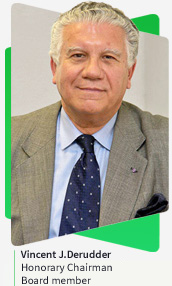|
 Vincent J.Derudder Vincent J.Derudder
FECIF Advisory Committee Member & Honorary Chairman
Building Partnerships with European Professional Associations
In 2000, under the presidency of Portugal, the “strategy of Lisbon” was launched to promote a European knowledge-based and competitive economy, in the paradigm of the competitive market economy in which the state intervenes as lightly as possible to establish a “level playing field” for competition and avoid the excesses of the free market economy in which large enterprises dominate and exercise market power.
Amongst the priorities set within the Lisbon process of national economic reform were (1) the reduction of administrative burdens and (2) the creation of an environment favourable to small and medium size enterprises (SMEs).
Unfortunately, the European Commission did not seek to encourage national reforms recognising the need to reduce administrative burdens and their related costs, in fact to the contrary!
National governments have, of course, done very little or nothing and have increased burdens upon business across all activities.
Increasing regulation driven by the perceived failure of ethical business practices
The financial crisis and the ensuing economic crisis have triggered a global policy effort to increase regulation and oversight of financial services and services provided to the financial sector. We are thus assisting in increasingly suffocating administrative burdens placed upon enterprises, having little financial manoeuvrability to absorb the time-consuming effort and cost related to such rising burdens couched in compliance activities.
Within the European Union, practical regulation and oversight are placed at the national level where national governments adapt directives and guidelines to suit their own purposes. They thus create a complex and conflicting cross-border network of compliance requirements that few enterprises are fully able to contend with.
The goal pursued by regulators and oversight bodies is that of investor protection. The attitude of national governments is that professionals are unable to sustain adequate self-regulation to ensure investor protection.
Additionally, it promotes the failure of ethical conduct and integrity as the “rules of the game” focus on meeting the maximum level of compliance requirements. In effect, we have a vicious circle in which professionals feel less and less responsible and accountable and regulators more and more set in their belief that they alone can impose investor protection through rules and regulations.
The professions, through their professional associations, are reduced to lobbying activities whose purpose is to endeavour to reduce, at best, the excesses of over regulation.
Engaging European and national regulators through co-regulation
The “Fédération Européenne des Conseils et Intermédiaires Financiers” (FECIF) can serve as a Centre for Excellence to engage European and national regulators and oversight bodies in promoting and developing co-regulation. The actions and activities are accomplished through the establishment, for instance, of the FECIF European Pensions Institute (FEPI) that addresses, through market survey, ad-hoc study, etc. a comprehensive review of the specific issues composing the complex domain of pensions and its related oversight.
The FECIF Advisory Committee is constituted of representatives of European professional associations who coordinate, with their members, the responses to the consultations organised by the European Commission, Parliament and other concerned bodies, and at the national level, ensure regulatory and oversight harmonisation of European Directives and guidelines.
In practical terms, the newly-created FECIF Digital Marketplace (FDM) is a forum for the associations, their members and business partners of FECIF that have, through a fully digital Marketplace, the ability to exchange ideas, introduce innovations, develop new products and/or services for the benefit of the members, for the members of the members, and the clients of the members.
Conclusions
Working together with national and professional associations, and their members, FECIF can collect, collate and provide unique research, and support and engage in actions and activities to promote co-regulation. In that way FECIF can bring its resources to bear in order to assist those organisations, their members and the clients of their members, and support an industry that provides quality financial services that are needed by all.
It is time to join us!
|